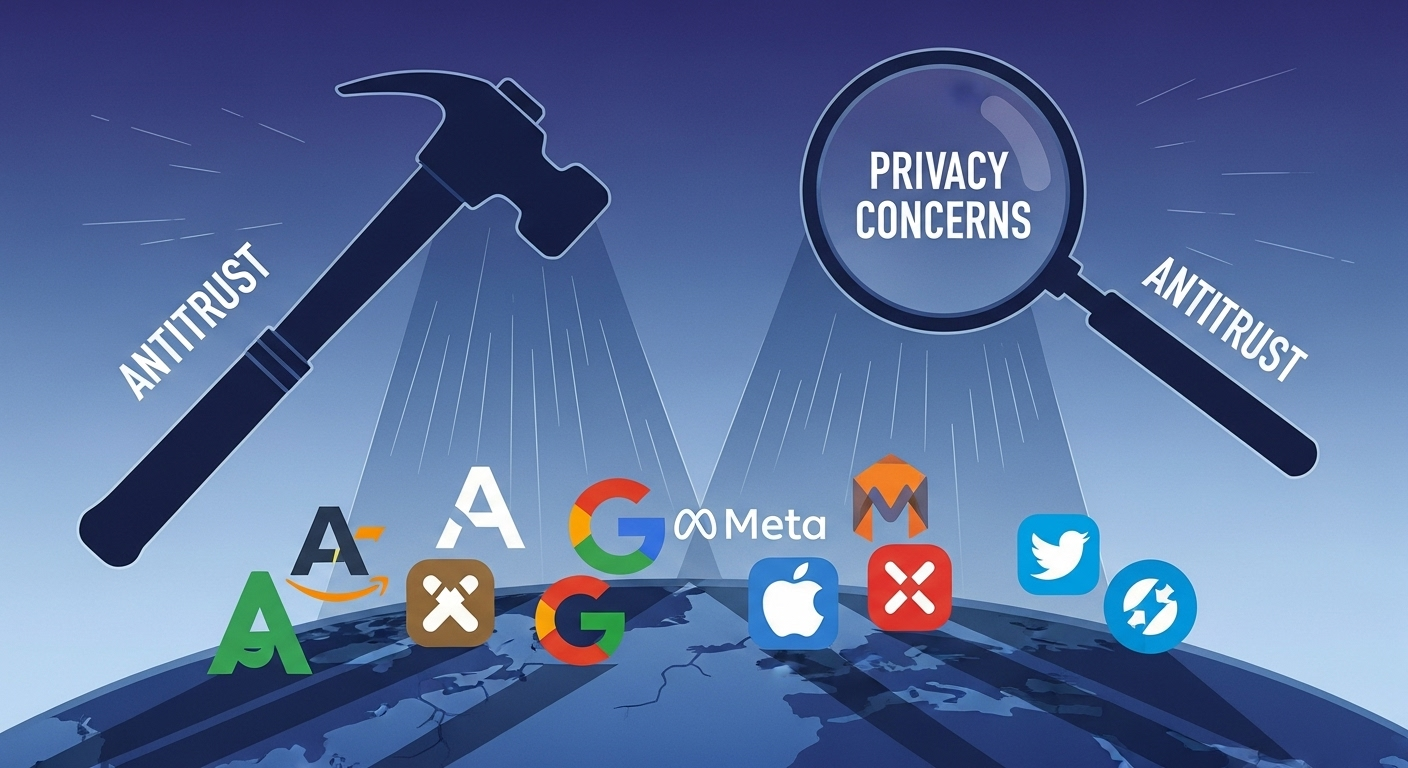Okay, let’s talk about something that’s been brewing for a while now, something that should be getting a lot more attention: the way these massive tech companies – you know, the ones that seem to control every aspect of our digital lives – are facing increasing scrutiny. And rightly so, if you ask me. We’re talking about antitrust issues and, maybe even more importantly, privacy concerns.
It’s not like this is some new, shocking revelation. The whispers have been growing louder for years. But it feels like we’re finally reaching a point where governments and individuals are starting to take real action. And honestly? It’s about time.
The Antitrust Angle: Are They Playing Fair?

Antitrust. It sounds so dry, doesn’t it? But here’s the thing: it’s about whether or not these tech giants are abusing their market power. Think about it. If one company essentially owns the market for social media, search engines, or online retail, they can stifle competition, jack up prices, and generally do whatever they want. That’s not good for innovation, and it’s definitely not good for consumers. Here’s a related news story about a community celebration.
I initially thought the antitrust stuff was just about preventing monopolies. Actually, that’s not quite right. It’s more nuanced than that. It’s about ensuring a level playing field. So smaller companies have a chance to compete, which ultimately benefits us all. The Justice Department, the FTC – they’re supposed to be the referees here. But are they strong enough to take on these behemoths? That’s the million-dollar question, isn’t it?
Privacy Matters: Who Has Your Data? And What Are They Doing With It?
Now, let’s move on to the really juicy stuff: privacy. I’ve got to admit, this part fascinates me. Because it’s not just about whether or not these companies are collecting our data (spoiler alert: they are). It’s about what they’re doing with it. Are they selling it to advertisers? Are they using it to manipulate our behavior? Are they keeping it safe from hackers? These are questions we need answers to.
Think about it this way: every time you use a search engine, every time you post on social media, every time you buy something online, you’re leaving a digital footprint. And these tech giants are vacuuming up all those footprints, creating incredibly detailed profiles of who we are, what we like, and what we’re likely to do next. That’s a lot of power in the hands of a few companies, and it raises some serious ethical questions. This is another related news story about AI.
And the thing is, it’s not always clear what’s happening behind the scenes. The terms of service are often deliberately vague and confusing. The privacy policies are long and convoluted. It’s like they don’t want us to know what’s going on. Data Privacy is key these days.
The Role of Regulation: Can Governments Keep Up?
Here’s the thing: technology moves fast. Really fast. Governments? Not so much. That’s why it’s been so difficult to regulate these tech giants effectively. The laws are often outdated, and the regulators lack the resources and expertise to keep up with the latest innovations. I mean the technology changes nearly daily.
But things are changing. The EU’s General Data Protection Regulation (GDPR) is a good example of how governments are starting to get serious about privacy. It gives individuals more control over their data and imposes hefty fines on companies that violate the rules. Other countries are following suit, and the US is finally starting to consider similar legislation.
But there’s a catch. Regulation can stifle innovation. If it’s too strict, it can make it difficult for new companies to compete. It’s a delicate balancing act. We need regulations that protect consumers and promote competition without hindering progress.
Tech Giants Face Scrutiny: What Can We Do?
So, what can we, as individuals, do about all this? Well, for starters, we can be more mindful of our digital footprints. We can use privacy-focused browsers and search engines. We can adjust our privacy settings on social media. We can support companies that prioritize privacy. And we can demand more transparency and accountability from the tech giants.
And maybe, just maybe, if enough of us speak up, we can create a digital world that’s both innovative and respectful of our privacy.
FAQ: Navigating the Complex World of Tech Regulation
Why are tech giants facing so much antitrust scrutiny right now?
Good question! It really boils down to concerns about market dominance. These companies have grown so large and powerful that they’re accused of stifling competition. They’re being looked at for potentially abusing their position to squash smaller rivals, limit consumer choice, and even manipulate prices. Basically, the argument is that they’re not playing fair, and regulators are finally stepping in to investigate whether they’re violating antitrust laws.
How is my personal data being used by these big tech companies?
That’s the million-dollar question, isn’t it? Essentially, every click, search, post, and purchase you make online generates data. This data is then collected, analyzed, and used to create a profile of you – your interests, habits, preferences, and even your vulnerabilities. This profile is then used to target you with personalized ads, recommend products, and even influence your behavior. The frustrating thing about this is often we, as consumers, don’t have any idea that this is happening, or the extent to which our information is being used.
What are the potential risks if tech giants aren’t held accountable?
The risks are pretty significant. Without proper oversight, these companies could continue to amass unchecked power, stifle innovation, and manipulate our behavior on a massive scale. This could lead to less competition, higher prices, less privacy, and a digital world that’s increasingly controlled by a handful of corporations.
How does antitrust legislation, for example, impact everyday consumers?
Think about it this way: more competition generally leads to better products, lower prices, and more choices. If tech giants are allowed to operate without any checks and balances, they can essentially dictate the terms of the market. This hurts consumers by limiting their options and potentially leading to higher costs for the products and services they use every day.
What about the common misconception that Tech Giants Face Scrutiny: Antitrust and Privacy Concerns are just a problem for other people?
That’s a dangerous mindset! The truth is, these issues affect everyone who uses the internet. Whether you’re concerned about your privacy, the cost of online services, or the overall health of the digital economy, it’s in your best interest to pay attention to what’s happening with these tech giants. Don’t think that it won’t affect you because it already is!



